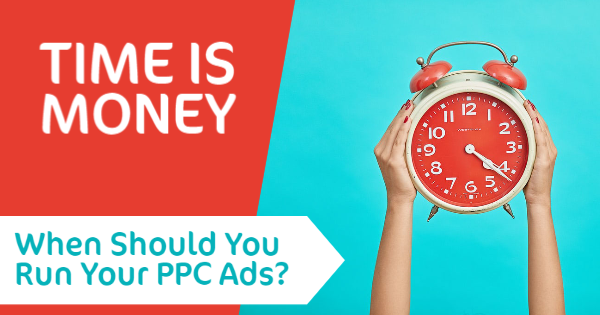For many business owners, pay per click marketing makes a lot of sense. Whether you’ve just launched your first offering or you’re looking to generate traffic quickly for a special sale, Google PPC advertisements can be a great way to go. And since mobile search advertising expenses are expected to reach $23.4 billion by the end of this year, it’s obvious that expert PPC management is a service many organizations are seeking.
In order to get the most out of your PPC marketing, you’ll need to know more than how to create an ad or bid on keywords. You’ll also need to determine the best time to run your ads. That goes beyond picking the optimal season for pay per click marketing; you’ll actually need to discern the best hour(s) of the day for your ads to appear.
If that prospect sounds overwhelming, remember that you don’t have to figure all of this out on your own. We’re here to provide you with proper guidance and management for your pay per click marketing campaigns. But to give you a clearer idea of just how detail-oriented PPC campaigns need to be, let’s talk about the best time to run your paid ads — and why timing really is everything.
You might be asking yourself: isn’t it better to have my PPC ads run constantly? If not, won’t I miss out on prospective customers? In some cases, the idea of potentially leaving money on the table can actually make you spend more than necessary. If you evenly distribute your PPC ads so that they’re running at all times, you might get a fair share of clicks — but you may not see a rise in conversions. By running your ads 24/7, you could end up spending your entire budget without much to show for it because your ads don’t have enough relevancy or urgency to seal the deal.
To get the most out of your pay per click marketing, you need to have an innate understanding of your target customer and when they’re most likely to want your products or services. At a bare minimum, you’ll need to know your customer’s general age, location, occupation, internet accessibility, and shopping habits. You can leverage this information to make educated guesses about when these users are likely to be online and what might drive them to make a purchase.
Of course, this provides merely a starting point for your pay per click marketing. After using demographic information (and any previous data you might have) to make some initial decisions about timing your PPC ads, you’ll want to test your theories and analyze the results. It’s generally a good idea to run some A/B testing to figure out whether your instincts were right or whether your ads need some additional tweaks to increase conversion rates. Fortunately, the Google AdWords platform offers ample opportunities to collect this data — and when put to good use by a PPC expert, you can significantly improve the success of your ad campaigns.
Ultimately, there’s no one-size-fits-all answer for PPC ad timing. If your target customer is a sports-loving college student, you’ll probably run your ads at very different times of day than those that are meant to appeal to a stay-at-home mom in her late 30s. And if you’re struggling with your PPC ad campaigns for any reason — whether it’s timing or keyword bids — our team is here to provide the guidance you need. For more information on how we’ll bring your PPC ads to the next level, please contact Studio98 today.

